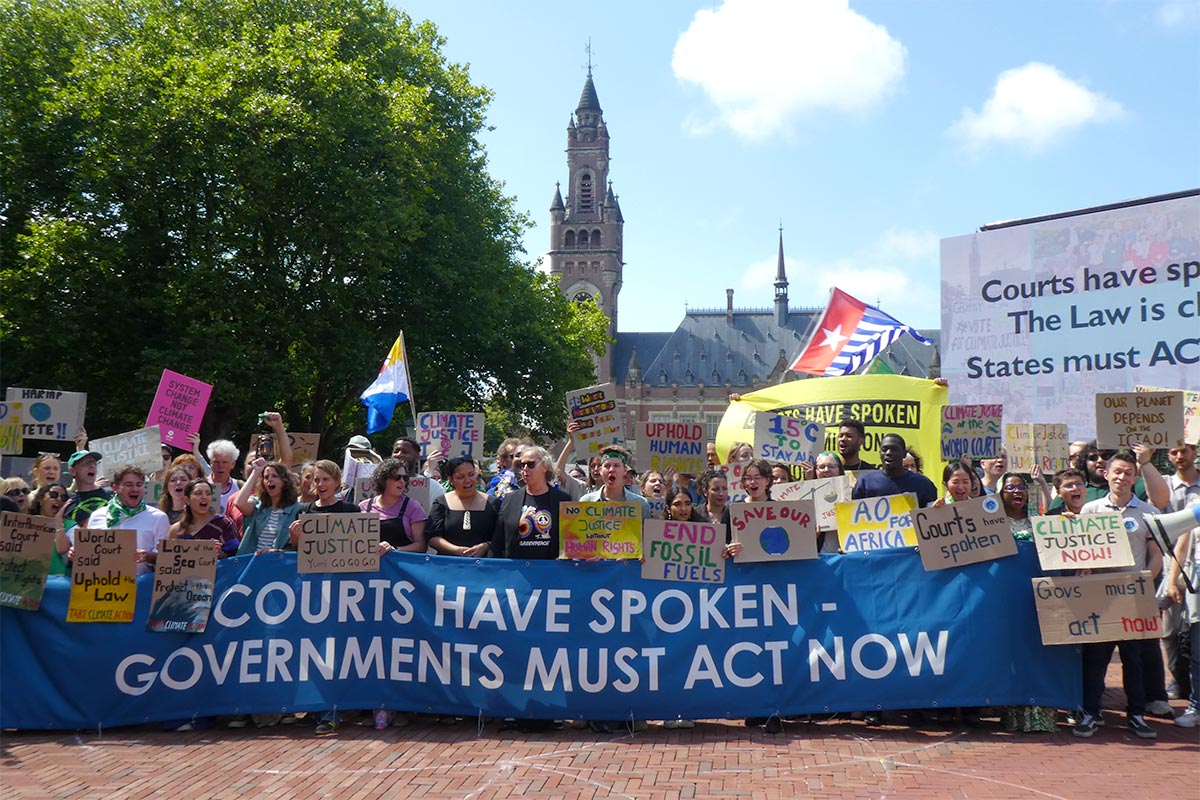It was a legal authority that activists worldwide were awaiting with trepidation. On July 23, the International Court of justice declared that climate change was “an existential problem of planetary proportions” for humanity. It stated the legal obligations of all states and the right to reparations for those suffering from big polluters.
A child looks at one of the islands of the Guna Yala archipelago in Panama, evacuated after being threatened by rising waters in May 2025. Photo: © Martin Bernetti / AFP
On July 23, the United Nations’ top court said that countries that do not comply with their climate obligations could be in violation of international law and could be required to compensate states that suffered harm. The International Court of Justice (ICJ) described climate change as an “existential problem of planetary proportions that imperils all forms of life and the very health of our planet”.
The reading of the advisory opinion was awaited with trepidation by activists who flew in from West Papua, Fiji and other countries to watch on a big screen set up outside the Peace Palace in the Hague, seat of the ICJ. Chanting and waving their national flags, about 50 demonstrators were united under a big banner saying “Courts have spoken - governments must act now”. It was also awaited by representatives of states and other organisations, who filled the public gallery.
“I did not expect it to be this good, it went above and beyond,” said in a press conference following the hearing Ralph Regenvanu, Minister of Climate Change Adaptation, Meteorology & Geo-Hazards, Energy, Environment and Disaster Management for the Republic of Vanuatu in the southwestern Pacific Ocean. “Today it has been a landmark milestone for climate action, and a very important course correction.” He added that the court’s opinion shows that obligations to protect the environment “aren't aspirational ideas as some would have it,” but “binding duties”.
This was the most participated case in the history of the ICJ. Spearheaded by Vanuatu in 2023, the UN General Assembly adopted a resolution to request an advisory opinion from the World Court. Over two weeks of hearings last December, 96 States and 11 international organisations – the highest number ever – presented their arguments on the two questions before the Court: What are countries’ obligations under international law to protect the climate system from anthropogenic greenhouse gas emissions?; and what are the legal consequences for countries that have caused harm to the environment, especially in relation to small island nations and vulnerable communities? Countries from the Global South and small states from the Pacific, heavily impacted by sea-level rises and extreme weather events, argued in favour of holding states accountable, while the main polluters, such as China and the United States, said that obligations are already outlined in existing treaties.
A clean, healthy and sustainable environment is a human right
During the two-hour-long reading of the opinion, president of the ICJ Judge Yuji Iwasawa said that states have an obligation to collaborate on mitigating their emissions and adapt to climate change. “Failure of a State to take appropriate action to protect the climate system from greenhouse gas emissions — including through fossil fuel production, fossil fuel consumption, the granting of fossil fuel exploration licences or the provision of fossil fuel subsidies — may constitute an internationally wrongful act,” he said.
"States must cooperate to achieve concrete emission reduction targets," he continued. He noted that the Paris Agreement contains obligations “to mitigation, adaptation, loss and damage, and co-operation in the form of finance, technology and capacity-building support”. All parties must therefore take measures to fulfil their obligations, he said, and they have to be reflected in their Nationally Determined Contributions (NDCs). These are climate plans submitted by countries every 5 years. While some argued that states have a degree of discretion in compiling them, the Court said that “each party has a due diligence obligation to do its utmost to ensure that the NDCs it puts forward represent its highest possible ambition” to stay within the 1.5 degree of global warming above preindustrial levels, which the ICJ set as the legal standard. Judge Iwasawa noted that science indicates that the increase in greenhouse gases is “unequivocally caused” by human activities and that the risks of losses and damages from climate change “escalate with every increment of global warming”.
The UN has warned that with current policies, the temperature will rise to more than 3 degrees above preindustrial levels by 2100. Nevertheless, the Trump administration has again withdrawn the United States from the 2015 Paris Climate Agreement and has taken funds away from scientific research studying climate change. But countries that are not parties to climate treaties are still bound by the same obligations under customary international law, said Judge Iwasawa.
During the December hearings, many of the top polluters had argued that the Paris Agreement and the UN Framework Convention on Climate Change (UNFCCC) are the decisive treaties when it comes to determining the legal obligations of States in the face of climate change. However, the Court now responded that the different laws it considered do not show any inconsistencies, so they complement each other and are all applicable. These laws include the Charter of the United Nations, the Kyoto Protocol, the UN Convention on the Law of the Sea, and other environmental treaties like the Ozone Layer Convention, the Montreal Protocol, the Biodiversity Convention and Desertification Convention, etc. Customary international law also applied, such as the Duty of States to prevent significant environmental harm and the Duty to co-operate for the protection of the environment - as well as key principles of human rights law. As guiding principles to interpret and apply the laws, the Court highlighted the principle of sustainable development, of common but differentiated responsibilities and respective capabilities, of equity, intergenerational equity, and the precautionary approach or principle.
The Court made it clear that “a clean, healthy and sustainable environment is a precondition for the enjoyment of many human rights, such as the right to life, the right to health and the right to an adequate standard of living, including access to water, food and housing. The Court thus concludes that, under international law, the human right to a clean, healthy and sustainable environment is essential for the enjoyment of other human rights”. Earlier this July, the Inter-American Court of Human Rights had come to similar conclusions, recognising the strong interaction between human rights and the environment in its own advisory opinion on climate change.

The end of climate impunity?
After stating countries' obligations to prevent harm to the environment, the Court turned to what consequences arise in case of a violation. It said that a breach in obligations “constitutes an internationally wrongful act”. And this has legal consequences. It “may require a State to revoke all administrative, legislative and other measures that constitute an internationally wrongful act”. And it can open rights to reparations. Reparations to injured States can take the form of restitution, which could mean “reconstructing damaged or destroyed infrastructure, and restoring ecosystems and biodiversity,” or compensation when that is not possible. These will be decided on a case-by-case basis, said the court. It recalled that there needs to be a sufficient causal nexus between the wrongful act and the injury, but the Court said that this is in principle possible to establish.
“The Court in this ruling has provided the full framework for holding States to account for pollutions that are internationally wrongful, unlawful, and that cause injury to other States, and even when no injury is caused yet,” commented Margaretha Wewerinke-Singh, legal counsel for Vanuatu’s ICJ case and an international lawyer at Blue Ocean Law, a law firm. She argued that “a whole range of defences that could be raised by the polluting States have already been dismissed”.
The judges addressed several arguments made in December by the wealthy states. Some of them argued that climate change is caused by collective actions and it is difficult, if not impossible, to attribute responsibility, and that unlawful conduct by private actors is not under the responsibility of States. However, in its advisory opinion, the Court concluded that science is advanced enough to potentially make responsibilities and historical impacts clear, and that each injured state can separately hold a polluting state accountable. It also said that “a State may be responsible where, for example, it has failed to exercise due diligence by not taking the necessary regulatory and legislative measures to limit the quantity of emissions caused by private actors under its jurisdiction”.
“It is a truly historic day for climate justice,” commented Vishal Prasad after the reading by the Court. He is one of the law students who back in 2019 started lobbying the government of Vanuatu to bring the case to the ICJ. In his view, the Court has now responded in “no uncertain terms”. “It has told the world that climate impunity is no longer allowed and that those who have caused the greatest harm are required to provide remedy to the people most affected. By affirming the science, the ICJ has mandated countries to urgently phase out fossil fuels. This opinion is a lifeline and an opportunity to protect all that we hold dear”.
FIND THIS ARTICLE INTERESTING?
Sign up now for our (free) newsletter to make sure you don't miss out on other publications of this type.
The future use of the ICJ’s findings
The advisory opinion was backed unanimously by the 15 judges. It is not binding but according to lawyers, it carries significant legal and political weight for future climate cases. Regenvanu said that the ICJ ruling will now inspire new climate litigations around the world. According to the 2025 figures by the London Grantham Research Institute on Climate Change and the Environment, at least 226 new climate cases were filed in 2024, bringing the total number of litigations to date to 2,967 across nearly 60 countries worldwide. “Domestic litigants will be able to make use of the ICJ’s opinion to add force to arguments that states failing to act credibly to reach net zero by 2050 are violating their legal obligations and can thus be held accountable in the courts,” said Margherita Cornaglia, a barrister specialising in climate and environmental justice at Doughty Street Chambers, a law firm in the UK.
Regenvanu explained that their next step will be to take the ICJ advisory opinion back to the UN General Assembly and “pursue a resolution to support the implementation of the decision”. He is also thinking of the UN Conference of the Parties on climate change, which will be held this November in Brazil. “We are approaching COP30 and we are a decade on from the Paris Agreement. It is very important now that we make sure our actions align with what was decided today.”
According to Wewerinke-Singh, “the era where polluters are free to decide on their climate policies is really over. We have entered an era of accountability where States can be held to account for their current emissions if they're excessive, but also for what they have failed to do in the past”. Talking to Justice Info in front of the Peace Palace, she explained that from the perspective of international law, this opinion must be complied with, regardless of the domestic systems. ”If the state does not do what it's supposed to do, and that can include a judge misinterpreting obligations or coming out with a ruling that contradicts what the ICJ has said, that in itself is a wrongful act for which the state as a whole can be held responsible, because courts are also organs of the state.”
The court also took the opportunity to state that climate migrants should be protected by the law. It said that “conditions resulting from climate change, which are likely to endanger the lives of individuals, may lead them to seek safety in another country or prevent them from returning to their own". States have an obligation not to return them to the country of origin if there is a "risk of irreparable harm". Additionally, it stressed that the statehood of countries continues to exist even if they lose their territories and their population is displaced. Even if inundated, small island states would keep their maritime boundaries.
In the last years, Vanuatu was hit by several cyclones, which destroyed well over half of its GDP. Ahead of the opinion, demonstrators outside the Court observed a minute of silence “for those we have already lost” to climate change. They also read poems, and a Fijian artist performed a traditional dance and played a song with his guitar. “The oceans are rising and so are we,” chanted the crowd while holding banners.
Wearing a traditional shirt and a bag with the flag of West Papua, Raki Ap, spokesperson of The United Liberation Movement for West Papua, was one of the people who watched the hearing outside the Peace Palace. Speaking to Justice Info before the hearing, he said that the Indonesian island is plagued by colonial structures, militarism, and extractive industries, as it holds one of the world’s biggest gold mines and largest deforestation projects. “So for West Papua, it is clear what the Court’s outcome can mean, that we can hold, for example, these companies and the military which is backing them up to account.” He added that they would use the Court’s opinion to fight for “the existence of tribes who lived there for thousands of years in balance with that forest, with those rivers, with those mountains”. The ICJ judges “have shown me that we are not powerless, that when you are organising, change is possible,” said Raki Ap. “Now it’s about how we use this tool to get more action,” concluded Sahil Chandra, media support officer for the Pacific Islands Students Fighting Climate Change.
The Court recognized, however, that climate change is a problem that the legal system alone cannot solve. “A complete solution to this daunting, and self-inflicted, problem requires the contribution of all fields of human knowledge,” Judge Iwasawa said at the end of the hearing. He concluded that a lasting solution “requires human will and wisdom – at the individual, social and political levels – to change our habits, comforts and current way of life in order to secure a future for ourselves and those who are yet to come”.
Justice Info is on Bluesky
Like us, you used to be a fan of Twitter but you're disappointed with X? Then join us on Bluesky and let's set the record straight, in a healthier way.









 English (US) ·
English (US) ·